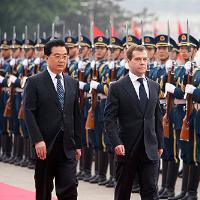Last month, the West officially lost the new "Great Game." The 20-year competition for natural resources and influence in Central Asia between the United States (supported by the European Union), Russia and China has, for now, come to an end, with the outcome in favor of the latter two. Western defeat was already becoming clear with the slow progress of the Nabucco pipeline and the strategic reorientation of some Central Asian republics toward Russia and China. Two recent events, however, confirmed it.
On Dec. 14, Chinese President Hu Jintao and the heads of state of Turkmenistan, Uzbekistan and Kazakhstan personally opened the valve of a new gas pipeline transporting Turkmen natural gas from the state-of-the-art processing facility of Samandepe to the city of Khorgoz, in China's western province of Xinjiang. The pipeline, developed by the Chinese state-owned energy giant, CNPC, has a capacity of 40 billion cubic meters and traverses almost 1,250 miles through four countries.
Earlier in the month, on Dec. 3, the venture had received the blessings of Russian Prime Minister Vladimir Putin, who declared that Moscow was comfortable with the idea of Turkmen gas flowing eastwards to China. Putin's words further underscored ongoing Sino-Russian energy cooperation, which has made significant advances and is shaping the new political economy of energy in Central Asia and elsewhere. In an accord signed on Oct. 13, the two countries set the basis for a long-term partnership based on joint explorations in Russia and third countries, as well as cheap loans from Chinese banks to the Russian energy sector, even if complex pricing issues remain unresolved.

